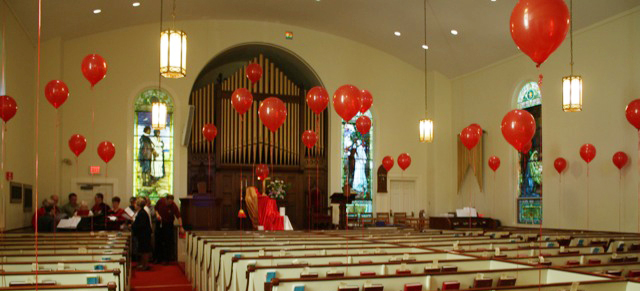A few years ago, on Pentecost Sunday, I noticed red and orange balloons streaming upward from the church altar. The service bulletin explained these were meant to symbolize the infamous tongues of fire at the first Pentecost.
After the service was over, I asked our pastor about this. “I don’t know what to do with Pentecost,” he mumbled.
Another church processed down the aisle on Pentecost Sunday morning with a plastic dove high on the end of a fishing pole, with a silky train like a wedding dress blowing in the soft breeze.

Jack Levison
Another church — one I respect enormously — handed out red pinwheels to signify fiery tongues moved by the Spirit at Pentecost.
Still another church sent out a newsletter with the heading, “Salsa and Chips.” Church members were encouraged to head downstairs on Pentecost Sunday to — literally — eat salsa and chips in order to set their tongues on fire. Then they were going to vote for new committee members.
These attempts by traditional churches tell us that, even if we see the connection of Pentecost with fiery tongues, it’s difficult to know what to do with it. That’s because we overlook the way Jesus’ followers used their tongues to transform the crowds around them who’d gathered to see what was happening in that Upper Room.
No sooner had the Holy Spirit appeared in tongues as of fire on each of Jesus’ followers than they were inspired to recite the praiseworthy acts of God in the hearing of a huge crowd gathered for the feast of Pentecost.
The words, “God’s praiseworthy acts,” are shorthand for God’s amazing actions throughout Israel’s history. In Deuteronomy, Moses encourages the Israelites to “acknowledge God’s praiseworthy acts, God’s mighty hand and God’s outstretched arm, God’s signs and God’s deeds that God did in Egypt to Pharaoh, the king of Egypt, and to all his land … until you came to this place” (Deuteronomy 11:2-5).
One of Israel’s poets writes a psalm that begins, “O give thanks to the LORD, call on God’s name, make known God’s deeds among the nations. Sing to God, sing praises to God; tell of all God’s praiseworthy acts” (Psalm 105:1-2).
God’s praiseworthy acts encompass a wide sweep of divine initiatives: the agreements made with Abraham and Israel’s ancestors, the 10 plagues, the astonishing exodus from Egypt, and finally God’s miraculous provision in the wilderness.
“Reciting God’s praiseworthy acts in public lies at the heart of Pentecost.”
When the Holy Spirit first descends upon the followers of Jesus during Pentecost, the content is clear and crisp even if the dialects are puzzling. These inspired followers recite those praiseworthy acts that comprise the warp and woof of Israel’s Scripture and now, for the first time, lead through the life and death of Jesus to the Resurrection, all the way up to Pentecost itself.
For all the emphasis in the story of Pentecost upon the rush of a violent wind, for all the focus on speaking in other tongues, for all the talk of drunken disciples, for all of this, what rises to the surface when the dust settles is a group of undistinguished followers of Jesus who can recite God’s praiseworthy acts.
So you can live into Pentecost even if you put away that plastic dove, pop those orange and red balloons, give those red pinwheels to your neighbors’ kids and pass on those salsa and chips. But you can’t set aside your Bibles, not if you want to transform your world, because reciting God’s praiseworthy acts in public lies at the heart of Pentecost.
Learning God’s praiseworthy acts by heart is something every Christian can do to prepare for Pentecost, whether or not we speak with fiery tongues — although reading the Bible carefully, studying it with curiosity, memorizing it, meditating on it and reciting it to others is hard work. That’s why, even though I’d be elated at any given moment to speak in tongues, I study in the shadow of Pentecost, sitting with my Bible open, with dictionaries and encyclopedias crowding my elbows, memorizing God’s praiseworthy acts, waiting for those occasions when God gives me the privilege of reciting them as if they matter, which they do.
Jack Levison holds the W. J. A. Power Chair of Old Testament Interpretation and Biblical Hebrew at Perkins School of Theology, Southern Methodist University. His latest book is Seven Secrets of the Spirit Filled Life: Daily Renewal Purpose and Joy When You Partner with the Holy Spirit. This post is an excerpt of Forty Days with the Holy Spirit.
Related article:
How to prepare for Pentecost | Opinion by Jack Levison

